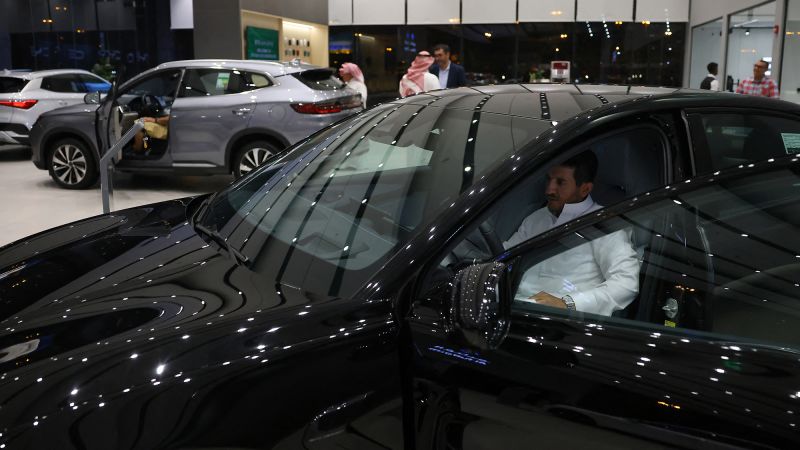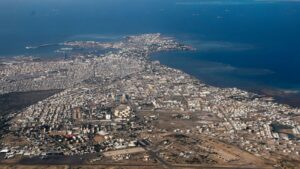
Electric vehicles (EVs) are becoming a common sight on roads worldwide, yet in Saudi Arabia, they account for a mere 1% of overall car sales. This is according to PricewaterhouseCoopers’ (PwC) “eMobility Outlook 2024: KSA Edition,” published in September 2024. Globally, about 18% of all cars sold in 2023 were electric, as reported by the International Energy Agency. However, the landscape in Saudi Arabia is on the brink of transformation.
The Electric Vehicle Infrastructure Company (EVIQ), a joint venture between the Public Investment Fund (PIF) and Saudi Electricity Company, is spearheading this change. Founded in late 2023, EVIQ aims to revolutionize the EV infrastructure in the country. By the end of 2023, there were approximately 285 public charging points, primarily slow chargers. In January 2024, EVIQ launched its first fast-charging station in Riyadh, with plans to expand to 5,000 fast chargers across 1,000 locations by 2030.
Challenges and Opportunities in Saudi Arabia’s EV Market
Despite the ambitious plans, several hurdles remain. Currently, more than 60% of EV models available in Saudi Arabia cost over $65,000, while nearly 73% of gasoline-powered models are priced below that threshold. Additionally, generous fuel subsidies make gasoline remarkably cheap, with a liter costing around 60 cents. These factors contribute to the slow adoption of EVs.
Moreover, the harsh Saudi climate poses challenges for EV batteries, which can struggle with high temperatures, affecting charging speed and range. The vast distances between cities, such as the 950 kilometers between Riyadh and Jeddah, further complicate the situation, as they exceed the average range of many EVs.
“Very few people are willing to buy an electric vehicle without having the comfort of seeing infrastructure being available,” EVIQ CEO Mohammad Gazzaz told CNN. “We’re paving the way.”
Building an EV Ecosystem and Local Manufacturing
Saudi Arabia is not only adopting electric vehicles but is also building an entire industrial ecosystem around them. The country is embracing eMobility as a strategic lever to decarbonize, diversify its economy, and localize manufacturing at scale. This includes plans to become an EV manufacturing hub.
The Public Investment Fund (PIF) is the largest shareholder in the U.S. automaker Lucid, which opened the first car manufacturing facility in Saudi Arabia in 2023. CEER, a joint venture between PIF and Taiwanese company Foxconn, plans to launch its first Saudi-produced EV by 2026. Additionally, a joint venture between PIF and Hyundai has commenced the construction of a manufacturing plant in the country.
Major EV producers are also entering the Saudi market. China’s BYD opened its first showroom in May 2024, and Tesla launched in Saudi Arabia in April. The introduction of Chinese models, such as BYD’s Atto 3, priced at approximately $27,000, is expected to drive prices down, making EVs more accessible.
Combating Range Anxiety and Expanding Infrastructure
According to PwC, more than 40% of Saudi consumers are considering purchasing an EV within the next three years. EVIQ has already installed chargers in Riyadh and Jeddah and rolled out its first highway EV charging station in April. The company plans to establish 50 to 60 new charging sites this year, including in smaller cities like Mecca and Medina.
“Ultimately we’re trying to cover about 70 to 80% of travel requirements across the Kingdom by 2026,” Gazzaz stated, emphasizing the goal of creating a “minimum viable network.”
Despite these efforts, experts believe that achieving the official target of 30% electric cars in Riyadh by 2030 will require additional measures. A survey by Saudi Arabia’s King Abdullah Petroleum Studies and Research Center and University College London suggests that financial incentives, such as VAT exemptions for new vehicles and subsidized charging, may be necessary to encourage widespread adoption.
The Road Ahead
Saudi Arabia’s commitment to EVs is part of a broader strategy to reduce dependence on oil revenues and lower carbon emissions. In 2024, oil accounted for 60% of government revenue, with crude oil and natural gas contributing over 20% to the country’s GDP. The shift towards electric vehicles represents a significant step in diversifying the economy and promoting sustainable growth.
As EV prices fall, model options expand, and government signals remain clear, the main challenge remains addressing range anxiety through improved public charging infrastructure. With continued investment and strategic planning, Saudi Arabia is poised to become a leader in the global transition to electric vehicles.





